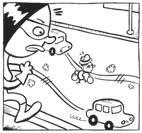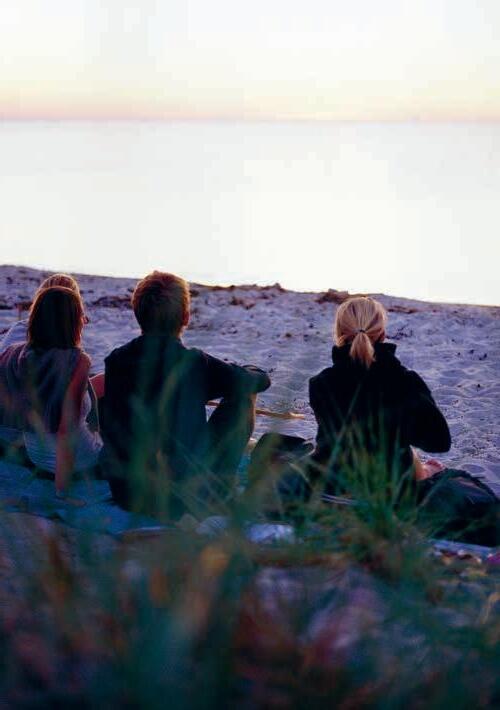BLUEPRINT
VERSION 3.0



ENGELSKA 5
VERSION 3.0
isbn 978-91-47-12101-4
© 2017 Christer Lundfall, Ralf Nyström och Liber AB
Redaktion Marie Ardehed
Formgivning Eva Jerkeman
Bildredaktion Marie Olsson
Produktion Anna Törnqvist Göpel
Tredje upplagan 1
Repro Repro 8 AB, Stockholm
Tryck Graphycems, Spanien 2017
Vi vill tacka våra lärargranskare för många värdefulla synpunkter. Tack till Johanna MacDonald för språkgranskning. Stort tack även till eleverna på Franska skolan, Stockholm, för mönstertexterna till Writer’s Workshop.
Kopieringsförbud
Detta verk är skyddat av upphovsrättslagen. Kopiering, utöver lärares och elevers begränsade rätt att kopiera för undervisningsbruk enligt BONUS-avtal, är förbjuden.
BONUS-avtal tecknas mellan upphovsrättsorganisationer och huvudman för utbildningsanordnare, t.ex. kommuner och universitet.
Intrång i upphovsmannens rättigheter enligt upphovsrättslagen kan medföra straff (böter eller fängelse), skadestånd och beslag/förstöring av olovligt framställt material.
Såväl analog som digital kopiering regleras i BONUS-avtalet. Läs mer på www.bonuscopyright.se.
Liber AB, 113 98 Stockholm
tfn 08-690 90 00
www.liber.se
kundservice tfn 08-690 93 30, fax 08-690 93 01
e-post: kundservice.liber@liber.se
bildförteckning
Foton: 6 plainpicture/Johnér
9 Per Hanstorp/Johnér
11 plainpicture/Johnér
18 Elliot Elliot/Johnér
21 Glasshouse Images/Johnér
29 (1) Vincent Laforet/NYT/TT
29 (2) Robert Galbraith/Reuters/TT
30 Deborah Lowery/Polaris/IBL Bildbyrå
32 Bernd Wüstnek/DPA/TT
33 Cheryl Ravelo/Reuters/TT
39 The Image Bank/Getty Images
49 (1) Charley Gallay/Getty Images
49 (2) The Washington Post/Getty Images
56 Walter McBride/Corbis/Getty Images
61 Hieronymus Bosch. Bridgeman/IBL Bildbyrå
65 Warner Bros/Kobal/REX/IBL Bildbyrå
66 Universal/Everett Collection/IBL Bildbyrå
67 Everett Collection/IBL Bildbyrå
71 Owen Kolasinski/BFA/IBL Bildbyrå
77 Cultura Creative/Johnér
81 Sang Tan/AP/TT
90 Rebecca Wallin/Johnér
207 (1) Bettman/Getty Images
207 (2) Everett Collection/IBL Bildbyrå
208 (1) Robert W. Kelley/LIFE/Getty Images
208 (2) Bettman/Getty Images
209 (1) Granger/REX/IBL Bildbyrå
209 (2) Derek Cattani/REX/IBL Bildbyrå
209 (3) Brian Snyder/Reuters/TT
210 London Features/Photoshot/IBL Bildbyrå
212 Walt Disney Co/Everett Collection/IBL
Bildbyrå
214 Walt Disney Co/Everett Collection/IBL
Bildbyrå
219 Carl Van Vechten/The Granger Collection/ TT
220 The Washington Post/Getty Images
224 KPA/Heritage-Images/TT
227 Peter Sorel/New Line/Kobal/REX/IBL
Bildbyrå
233 Earl Gibson III/Getty Images
235 Ted S. Warren/AP/TT
241 Taraji P. Henson, Octavia Spencer and Janelle Monae in Hidden Figures (2017). ©20th Century Fox/LMK/IBL Bildbyrå
Övriga foton: Shutterstock
Illustrationer
17 Johan Wanloo
173–178 Craig Thompson
Karta
105 Liber arkiv
Bildbyrå
155 Jayanta Shaw/Reuters/TT
157 photonic 1/Alamy/IBL Bildbyrå
166 plainpicture/Johnér
169 Rahel Patrassso Xinhua/Eyevine/IBL
Bildbyrå
170 Eyevine/IBL Bildbyrå
184 Mary Altaffer/AP/TT
188 Sam Simmonds/IBL Bildbyrå
191 https://en.wikipedia.org/wiki/June_Eric-
Udorie. Russel Watkins CC BY 2.0
192 Maskot/TT
199 Portland Press Herald/Getty Images
204 Hannah McKay/EPA/TT
206 (1) Photoresearchers/IBL Bildbyrå
206 (2) Barbara Cushing/Everett Collection/IBL Bildbyrå
I Blueprint A Version 3.0 för kursen Engelska 5 har vi behållit och byggt ut det som Sveriges lärare verkligen uppskattat genom åren: Blue Pages, den ”blueprint” till textproduktion där varje texttyp utvecklas genom guidelines, marginalkommenterade mönstertexter och revision checkpoints. Mönstertexterna kompletteras nu med ytterligare exempeltexter på lägre betygsnivåer samt med bedömningsmatriser. På så sätt får eleverna själva möjlighet att upptäcka svagheter i sitt och andras skrivande och undersöka åtgärder för att avhjälpa bristerna. Det blir också en hjälp för lärare att bedöma elevernas skrivande.
Vi har tagit fasta på önskemålen om autentiska hörövningar i arbetet med Blueprint A Version 3.0. Minst två Focus on Listening i varje kapitel tränar elevernas hörförståelse av autentiska möten, reportage eller föredrag som sänts på BBC, NPR, TED Talk med mera.
Varje kapitel i boken utvecklar successivt elevernas förmåga att utföra de skriftliga och muntliga framställningar som kursplanens centrala innehåll anger för engelska 5: att instruera, berätta, sammanfatta, förklara, kommentera, värdera, motivera sina åsikter, diskutera och argumentera.
Kapitlen innehåller texter och hörövningar som sätter teman i relation till elevernas egna erfarenheter – och utmanar dem. Blueprint A Version 3.0 anknyter till händelser, åsikter, idéer, känslor, relationer och etiska frågor. Innehållsfrågor i Reading/Listening for meaning och diskussionsuppgifter i Reflect & Share bygger upp och fördjupar förståelsen av texterna respektive hörövningarna. Ordövningar i Word Work betonar strukturer och utvecklar det mest frekventa och användbara ordförrådet. Gloslistorna är frekvensmarkerade enligt Macmillans English Dictionary for Advanced Learners.
I Blueprint A Version 3.0 tillämpar vi ett tydligare lexikaliskt synsätt. Både i ordövningar och i de nya gloslistorna övas collocations, det vill säga ordpar eller grupper av ord som normalt förekommer tillsammans och bör läras in som språkliga enheter eller hela fraser. Det är också viktigt att ta till sig de sammanhang som orden förekommer i för att kunna förstå exakta betydelser och senare kunna använda orden korrekt i produktion.
I webbappen får eleverna extra övning och möjlighet att testa sig själva.

“The secret of getting ahead is getting started,” Mark Twain said. This course book gives you a head start in English. Together with new classmates and teachers, you will be exploring unknown territories.
1. Work in pairs. Take turns interviewing each other. Ask your classmate about the following topics. Remember to take notes on your classmate’s answers.
■ why he/she chose this study program
■ her/his favourite free-time activity
■ something he/she really hates doing
■ something he/she loves doing
■ something unusual he/she would like to do
2. Form groups of 2–3 pairs. Introduce your classmate to the other students in the group. Try to speak for half a minute. Use some of these conversation linkers to give your talk more fluency:
It might surprise/interest you to hear that X …
Another very interesting side to X is …
In addition to …, X (is) also …
Moving on to another side of X, … On the other hand, X …
Finally, X’s ambition is to …
One more thing that needs to be said about X is … Last but not least, X …
“The problem with my life was that it was someone else’s idea,” is one of many one-liners delivered by Ari, the main character in Benjamin Alire Sáenz’ novel Aristotle and Dante Discover the Secret of the Universe. And Ari does have all kinds of tragic reasons for feeling sorry for himself. He is lonely. Plus, for Ari, being fifteen doesn’t help. Actually he considers it the worst tragedy of all. But meeting Dante by the pool on a hot summer’s day is a turning-point and Ari Mendoza gradually stops wishing he is the last boy on Earth.
WHEN I GOT TO THE POOL, I HAD TO TAKE A SHOWER. That was one of the rules. Yeah, rules. I hated taking a shower with a bunch of other guys. I don’t know, I just didn’t like that. You know, some guys liked to talk a lot, like it was a normal thing to be in the shower with a bunch of guys and talking about the teacher you hated or the last movie you saw or the girl you wanted to do something with. Not me, I didn’t have anything to say. Guys in the shower. Not my thing.

punk young man who has no status
Walt Whitman famous American poet (1819–1892I walked to the pool and sat on the shallow side and put my feet in the water.
What do you do in a pool when you don’t know how to swim? Learn. I guess that was the answer. I had managed to teach my body to stay afloat on water. Somehow, I’d stumbled on some principle of physics. And the best part of the whole thing was that I‘d made the discovery all on my own.
All on my own. I was in love with that phrase. I wasn’t very good at asking for help, a bad habit I inherited from my father. And anyway, the swimming instructors who called themselves lifeguards sucked. They weren’t all that interested in teaching a skinny fifteen-year-old punk° how to swim. They were pretty much interested in girls that had suddenly sprouted breasts. They were obsessed with breasts. That’s the truth. I heard one of the lifeguards talking to one of the other lifeguards as he was supposed to be watching a group of little kids. “A girl is like a tree covered with leaves. You just want to climb up and tear all those leaves off.”
The other guy laughed. “You’re an asshole,” he said.
“Nah, I’m a poet,” he said. “A poet of the body.”
And then they both busted out laughing.
Yeah, sure, they were budding Walt Whitmans°, the two of them. See, the thing about guys is that I didn’t really care to be around them. I mean, guys really made me uncomfortable. I don’t know why, not exactly. I just, I don’t know, I just didn’t belong. I think it embarrassed the hell out of me that I was a guy. And it really depressed me that there was the distinct possibility that I was going to grow up and be like one of those assholes. A girl is like a tree? Yeah, and a guy is about as smart as a piece of dead wood infested with termites. My mom would have said that they were just going through a phase. Pretty soon they would get their brains back. Sure they would.
Maybe life was just a series of phases—one phase after another after another. Maybe, in a couple of years, I’d be going through the same phase as the eighteen-year-old lifeguards. Not that I really believed in my mom’s phase theory. It didn’t sound like an explanation—it sounded like an excuse. I don’t think my mom got the whole guy thing. I didn’t get the guy thing either. And I was a guy.
I had a feeling there was something wrong with me. I guess I was a mystery even to myself. That sucked. I had serious problems.
One thing was for sure: there was no way I was going to ask one of those idiots to help me out with my swimming. It was better to be alone and miserable. It was better to drown.

So I just kept to myself and sort of floated along. Not that I was having fun.
That’s when I heard his voice, kind of squeaky. “I can teach you how to swim.”
I moved over to the side of the pool and stood up in the water, squinting into the sunlight. He sat down on the edge of the pool. I looked at him suspiciously. If a guy was offering to teach me how to swim, then for sure he didn’t have a life. Two guys without a life? How much fun could that be?
I had a rule that it was better to be bored by yourself than to be
relieved happy because you are no longer worried about something
bored with someone else. I pretty much lived by that rule. Maybe that’s why I didn’t have any friends.
He looked at me. Waiting. And then he asked again. “I can teach you how to swim, if you want.”
I kind of liked his voice. He sounded like he had a cold, you know, like he was about to lose his voice. “You talk funny,” I said.
“Allergies,” he said.
“What are you allergic to?”
“The air,” he said.
That made me laugh.
“My name’s Dante,” he said.
That made me laugh harder. “Sorry,” I said.
“It’s okay. People laugh at my name.”
“No, no,” I said. “See, it’s just that my name’s Aristotle.”
His eyes lit up. I mean, the guy was ready to listen to every word I said.
“Aristotle,” I repeated.
Then we both kind of went a little crazy. Laughing.
“My father’s an English professor,” he said.
“At least you have an excuse. My father’s a mailman. Aristotle is the English version of my grandfather’s name.” And then I pronounced my grandfather’s name with this really formal Mexican accent, “Aristotiles. And my real first name is Angel.” And then I said it in Spanish, “Angel.”
“Your name is Angel Aristotle?”
“Yeah. That’s my real name.”
We laughed again. We couldn’t stop. I wondered what it was we were laughing about. Was it just our names? Were we laughing because we were relieved°? Were we happy? Laughter was another one of life’s mysteries.
“I used to tell people my name was Dan. I mean, you know, I just dropped two letters. But I stopped doing that. It wasn’t honest. And anyway, I always got found out. And I felt like a liar and an idiot. I was ashamed of myself for being ashamed of myself. I didn’t like feeling like that.” He shrugged his shoulders.
“Everyone calls me Ari,” I said.
“Nice to meet you, Ari.”
I liked the way he said Nice to meet you, Ari. Like he meant it.
“Okay,” I said, “teach me how to swim.” I guess I said it like I was doing him a favor. He either didn’t notice or didn’t care.
1. Choose one of Ari’s thoughts below and tell your classmate about something you discovered on your own, or how somewhere, sometimes you feel you don’t belong. Or tell your classmate what makes you laugh, or when you feel like an idiot.
2. The narrator uses a couple of ironies in this story. Find them and explain what is really meant by them.
“And the best part of the whole thing was that I‘d made the discovery all on my own.”
“I just didn’t belong.”
”I wondered what it was we were laughing about.”
“I felt like a liar and an idiot.”
cultural clash
kulturkrock
unedited gossip
oredigerat skvaller
compete tävla
academics studier
substitute teacher vikarie
finals slutexamen
dorm studenthem
field house idrottshall
events idrottsgrenar
Are you travelling across the world or typing away at your keyboard? Either way you are getting out on your own. When Radio Blueprint meets Sophie Chapman, she is just finishing her first year in college – thousands of miles from her home town. Having left her native country behind her, she is now sharing her experience as an exchange student on her blog. Radio Blueprint meets her at her dorm in Sydney, Australia, and she talks about her first year in college and her decision to go public as a blogger.
Look at the words and read through questions 1–4 before you listen.

1. What activities did Sophie do herself? Write down the appropriate letters.
a) blogging
b) going to a concert
c) going to a party
d) climbing a wall
e) skateboarding
f) jumping on a trampoline
g) dressing up
h) playing basketball
i) looking at fireworks
j) seeing a film
k) working as a substitute teacher
l) studying hard for tests
m) hiking
n) diving
o) kite surfing
p) playing in a band
2. Sophie wants to go to a concert, but doesn’t want to spend the money to pay for the ticket. What happens?
3. What makes Sophie want to become a teacher?
4. A few years have passed since Sophie started her blog. Which pieces of her advice are still valid today?
5. If blogging was hot 10 years ago – what is the best or most frequent social media today, available for the young generation who wants to reach out?
Prepare individually, then form groups to share and discuss.
1. Describe Sophie’s character supporting your description with details from the interview.
2. Sophie writes about cultural clashes in her blog. Have you ever experienced any clashes or funny situations when travelling or meeting people from other countries?


When applying for a year at a high school, in the USA for example, you are often asked to write a personal letter to your host family explaining why you want to study and live abroad. Included, there will also be a short introduction about yourself. Use the template below.
… Date
To Mr and Mrs Johnson
15 Union Street Dayton, Ohio 20041 USA
Dear Mr and Mrs Johnson,
My name is … . I am so thankful for ... .
I have long wanted to … Explain why you want to spend a school year in the US.
I hope the year in the US will … Some of my expectations/dreams/ ambitions are … What I very much look forward to is …
I am now studying at …
Present your school, what program, why you chose it, what is special about your school and program.
… Write briefly about yourself: family, interests, free-time activities, pets etcetera.
I am looking forward to meeting and staying with you.
Kind regards/Best wishes
… Your name/signature
Look at the cartoon strip. Decide on a possible order of the pictures and make up a story to go with them. Then work in pairs and share your suggestions.


Summer vacation generally means outdoor activities and challenging adventures. New experiences make our lives richer – some of them good, some maybe not so good. A few of them will stay as memories and broaden our outlook on life.
■ What do you know about summer camps in the US?
■ What do you do at a summer camp?
from The Red Notebook by Paul
AusterSometimes dramatic incidents change your whole outlook on life. That is what happened to the American author Paul Auster when as a teenager he was at a summer camp in New York State.
hitting the cut-off man hitting a counterpart (in baseball)
tutored taught counselor someone who takes care of younger people at a summer camp wise-cracking funny
There were sixteen or eighteen boys in my group. Most of us had been together for several years, but a couple of newcomers had also joined us that summer. One was named Ralph. He was a quiet kid without much enthusiasm for dribbling basketballs or hitting the cut-off man°, and while no one gave him a particularly hard time, he had trouble blending in. He had flunked a couple of subjects that year, and most of his free periods were spent being tutored° by one of the counselors°. It was a little sad, and I felt sorry for him – but not too sorry, not sorry enough to lose any sleep over it.
Our counselors were all New York college students from Brooklyn and Queens. Wise-cracking° basketball players, future dentists, accountants, and teachers, city kids to their very bones. Like most true New Yorkers they persisted in calling the ground the ‘floor’, even when all that was under their feet was grass, pebbles, and dirt. /…/
Imagine our surprise, then, when one afternoon our counselor announced that we were going for a hike in the woods. He had been seized by an inspiration and wasn’t going to let anyone talk him out of it. Enough basketball, he said. We’re surrounded by nature, and it’s time we took advantage of it and started acting like real campers – or words to that effect. And so, after the rest period that followed lunch, the whole gang of sixteen or eighteen boys along with two or three counselors set off into the woods.
It was late July, 1961. Everyone was in a fairly buoyant mood, I
remember, and half an hour or so into the trek most people agreed that the outing had been a good idea. No one had a compass, of course, or the slightest clue as to where we were going, but we were all enjoying ourselves, and if we happened to get lost, what difference would that make? Sooner or later, we’d find our way back.
1. What do we learn about Ralph?
2. What are we told about the counselors?
3. What do you think is going to happen – and to whom?

smolder burn slowly without a flame helter-skelter stampede disorganised rush
Then it began to rain. At first it was barely noticeable, a few light drops falling between the leaves and branches, nothing to worry about. We walked on, unwilling to let a little water spoil our fun, but a couple of minutes later it started coming down in earnest. Everyone got soaked, and the counselors decided we should turn around and head back. The only problem was that no one knew where the camp was. The woods were thick, dense with clusters of trees and thorn-studded bushes, and we had woven our way this way and that, abruptly shifting directions in order to move on. To add to the confusion, it was becoming hard to see. The woods were dark to begin with, but with the rain falling and the sky turning black, it felt more like night than three or four in the afternoon.
Then the thunder started. And after the thunder, the lightning started. The storm was directly on top of us, and it turned out to be the summer storm to end all summer storms. I have never seen weather like that before or since. The rain poured down on us so hard that it actually hurt; each time the thunder exploded, you could feel the noise vibrating inside your body. Immediately after that, the lightning would come, dancing around us like spears. It was as if weapons had materialized out of thin air: a sudden flash that turned everything a bright, ghostly white. Trees were struck, and the branches would begin to smolder°. Then it would go dark again for a moment, there would be another crash in the sky, and the lightning would return in a different spot.
The lightning was what scared us, of course. It would have been stupid not to be scared, and in our panic we tried to run away from it. But the storm was too big, and everywhere we went we were met by more lightning. It was a helter-skelter stampede°, a headlong rush in circles. Then, suddenly, someone spotted a clearing in the woods. A brief dispute broke out over whether it was safer to go into the open or continue to stand under the trees. The voice arguing for the open won, and we all ran in the direction of the clearing.
4. In what ways are the counselors unfit to cope with the situation?
5. What do the boys decide to do to be safe?
It was a small meadow, most likely a pasture° that belonged to a local farm, and to get to it we had to crawl under a barbed wire° fence. One by one, we got down on our bellies and inched our way through. I was in the middle of the line, directly behind Ralph. Just as he went under the barbed wire, there was another flash of lightning. I was two or three feet away, but because of the rain pounding against my eyelids, I had trouble making out what happened.

All I knew was that Ralph had stopped moving. I figured that he had been stunned°, so I crawled past him under the fence. Once I was on the other side, I took hold of his arm and dragged him through.
I don’t know how long we stayed in that field. An hour, I would guess, and the whole time we were there the rain and thunder and lightning
pasture a field used for cattle to eat barbed wire strong wire with sharp pointed parts stunned unconscious
tinge color electrocuted kill someone with electricity
continued to crash down upon us. It was a storm ripped from the pages of the Bible, and it went on and on and on, as if it would never end.
Two or three boys were hit by something – perhaps by lightning, perhaps by the shock of lightning as it struck the ground near them –and the meadow began to fill with their moans. Other boys wept and prayed. Still others, fear in their voices, tried to give sensible advice. Get rid of everything metal, they said, metal attracts the lightning. We all took off our belts and threw them away from us.
I don’t remember saying anything. I don’t remember crying. Another boy and I kept ourselves busy trying to take care of Ralph. He was still unconscious. We rubbed his hands and arms, we held down his tongue so he wouldn’t swallow it, we told him to hang in there. After a while, his skin began to take on a bluish tinge°. His body seemed colder to my touch, but in spite of the mounting evidence, it never once occurred to me that he wasn’t going to come around. /…/ I had never seen a dead person before.
It was the barbed wire that did it, I suppose. The other boys hit by the lightning went numb, felt pain in their limbs for an hour or so, and then recovered. But Ralph had been under the fence when the lightning struck, and he had been electrocuted° on the spot.
Later on, when they told me he was dead, I learned that there was an eight-inch burn across his back. I remember trying to absorb this news and telling myself that life would never feel the same to me again. Strangely enough, I didn’t think about how I had been right next to him when it happened. I didn’t think. One or two seconds later, and it would have been me. What I thought about was holding his tongue and looking down at his teeth. His mouth had been set in a slight grimace, and with his lips partly open, I had spent an hour looking down at the tips of his teeth. Thirty-four years later, I still remember them. And his half-closed, half-open eyes. I remember those, too.
6. Why does the narrator have problems understanding what happened?
7. How is the narrator trying to bring Ralph back to life?
8. How close is the narrator himself from being killed?
9. In what way has the accident stayed with the author? Look at the last paragraph.
Prepare individually, then form groups to share and discuss. What steps should be taken to improve safety at the camp in Paul Auster’s story?
Telling a story
1. What coincidences or encounters have you experienced? Individually, prepare to tell a group about an occasion that you remember where chance/coincidence had a strong effect on you in some way. It can also be a positive experience that changed you in some way, like doing something for the first time, winning a prize in a competition or meeting someone special.
2. Form groups of 4–6 students. Tell the group about your experience. Try to speak for 30 seconds.
A. Synonyms
Part 1 – What words are used in the text?
In the story the author uses other words that give a similar meaning to those in italics. Choose from the box below. clusters dense enjoying themselves
themselves
head back persisted in seized
set off spoil unwilling
set
1. The councelors kept calling the ground the ‘floor’.
2. One of the counselors had been caught by an inspiration.
3. Along with two or three counselors the whole group started to walk into the woods.
4. They were all happy.
5. They walked on, reluctant to let a little rain destroy their fun.
6. Everyone got soaked, and they decided to turn around and return.
7. The woods were thick, compact with groups of trees and thornstudded bushes.
1. It would go dark, and then the lightning would come back in a different place.
2. Suddenly someone caught sight of a clearing in the woods.
3. A short quarrel broke out over whether it was safer to go into the open.
4. The voice supporting the open won.
5. One by one, they got down on their stomachs and inched through the barbed wire.
6. The boys wept and called upon God.
7. Some tried to give good practical advice.
8. Ralph was still knocked out.
9. The other boys felt pain for an hour, and then got well again.
Read the sentences in part 1 and 2 again to yourself or to a classmate. Cover the boxes, and don’t look at what you have written. Practise until you remember all the synonyms.
1. To help you, study the boxes below and the wordlist on page 304–305 closely.
2. Combine the words in the box on the left with a word from the box on the right. There are two combinations for each word. Write on a separate piece of paper.
VERB S pound
N O UN S your balance the the new consciousness a your the
VERBS NOUNS absorb a pony your balance mount power your eyes pound sweat the drums recover the chance new facts rub consciousness a rescue operation seize your cheek the door
Work with a classmate. Take it in turns to cover either the verbs or the nouns and say the collocations to each other.
Study the marked words in the wordlist, particularly the information on alternative meanings, on page 304–305 closely. Then read the gapped sentences below and fill in the appropriate words from the wordlist. You may have to change the form of the word to fit the sentence.
1. The students have … a campaign for better school lunches.
2. We must immediately … the opportunity to create a good class spirit.
3. It was a spectacular … to see the swimming elephants.
4. It took some time for her to … the new ideas about learning new words more efficiently.
5. At yesterday’s football match there was a nasty … which could have ended terribly badly.
6. My camera has a … that goes on automatically when it’s too dark.
7. Following the violent protests, the police tried to … control of the neighbourhood.
8. An uneasy feeling is … among the spectators that something is terribly wrong.
9. What is your … immigration?
10. She tried to remember the best and most important … of the year.
11. Dioxin is a poisonous … that we must avoid at all costs.
Read the sentences again to yourself or a classmate, without looking at what you have written in the gaps.
■ Read the text about Louisiana and study the wordlist in the margin on page 30. What do you expect to hear?
The Mississippi River Delta is known for its French and Spanish heritage. The biggest city is New Orleans. A city famous for its cuisine and its music, particularly jazz.
On the morning of August 29, 2005, Hurricane Katrina struck the city. The aftermath was catastrophic; the levee system broke and caused massive flooding. The most significant number of deaths occurred in New Orleans, Louisiana, and hundreds of thousands of people along the coast had to flee their homes. It is estimated that Katrina caused more than $100 billion in damage.



tiny mycket liten neighbourhood stadsdel concept idé, föreställning hurricane orkan flooded översvämmad capture the essence fånga det väsentliga/kärnan
chef kock
CNN amerikansk
nyhetskanal
With natural disasters, like a lethal stroke of lightning, life and death can be at stake. Listen to a life-changing experience, as Trombone Shorty tells his story.
Read through the questions before you listen.

1. What does Trombone Shorty tell us about his first band?
2. Why is Troy Andrews called Trombone Shorty?
3. What does he say is so special about the neighbourhood Treme?
4. What is the concept, or main idea, in the TV series “Treme”?
5. What did Trombone Shorty do when Hurricane Katrina hit the city?
6. How did Trombone Shorty feel on the morning following the catastrophe?
7. Why was the Convention Center the safest place to be that day?
8. What did Trombone Shorty do to show he was not turning his back on New Orleans?
Express reaction
Write a short text for 10–20 minutes. Express your reaction or reflections after listening to the interview with Trombone Shorty. Start by completing one of the prompts below. Then explain why.
What I find interesting is …
What I find moving is …
What I find admirable is …
What I find encouraging is …
Instructions
Learn how to give first aid for adults, children, infants and your family pet.
1. Form groups of four.
2. Each member of the group picks one category. Use any search engine on the internet to find relevant information on CPR (cardiopulmonary resuscitation).
3. Prepare a short presentation. Make sure the instructions are divided into simple steps.
4. Teach the other three group members the crucial steps for first aid (how to call emergency, how to do mouth-to-mouth, and how to pump the chest etcetera).
©P. 267 INSTRUCTIONS
©P. 268
USEFUL PHRASES
There are certain conventions for how science articles or reports are organized. They start by defi ning a problem, and then move on to describe different aspects of the issue more closely, including fi ndings of recent research. They normally end with a summary or proposals for possible solutions.
Being familiar with these conventions will help you understand a science article that you are about to read, since you know what to expect.
1. Skim this text quickly to find
■ the problem
■ some of the research findings
2. Then read the article closely and answer the questions in Reading for Meaning.
 from The Guardian by Robin McKie
from The Guardian by Robin McKie
From supermarket bags to CDs, man-made waste has contaminated° the entire globe, and become a marker of a new geological epoch.
Humans have made enough plastic since the Second World War to coat the Earth entirely in clingfilm°, an international study has revealed. This ability to plaster the planet in plastic is alarming, say scientists – for it confirms that human activities are now having a pernicious impact° on our world.
The research, published in the journal Anthropocene, shows that no part of the planet is free of the
scourge of plastic waste. Everywhere is polluted with the remains of water containers, supermarket bags, polystyrene lumps, compact discs, cigarette filter tips, nylons and
other plastics. Some are in the form of microscopic grains, others in lumps. The impact is often highly damaging.
“The results came as a real surprise,” said the study’s lead author, Professor Jan Zalasiewicz, of Leicester University. “We were aware that humans have been making increasing amounts of different kinds of plastic – from Bakelite to polyethylene bags to PVC – over the last 70 years, but we had no idea how far it had travelled round the planet. It turns out not just to have floated across the oceans, but has sunk to the deepest parts of the sea floor. This is not a sign that our planet is in a healthy condition either.”
The crucial point about the study’s findings is that the appearance of plastic should now be considered

as a marker for a new epoch. Zalasiewicz is the chairman of a group of geologists assessing° whether or not humanity’s activities have tipped the planet into a new geological epoch, called the Anthropocene, which ended the Holocene that began around 12,000 years ago.
Most members of Zalasiewicz’s committee believe the Anthropocene has begun and this month published a paper in Science in which they argued that several postwar human activities show our species is altering° geology. In particular, radioactive isotopes released by atom bombs left a powerful signal in the ground that will tell future civilisations that something strange was going on.
In addition, increasing carbon dioxide in the oceans, the massive manufacture° of concrete and the
assessing carefully considering altering changing manufacture production
Den omtyckta BLUEPRINT är uppgraderad: tolv autentiska hörövningar, nya exempeltexter för kursplanens alla texttyper, utbyggda ordövningar och kommentarer i gloslistor. VERSION 3.0 startar med ett varmt introduktionskapitel, Meeting new Friends, där eleverna får en skön mjukstart på läsåret, och fortsätter med texter som berör, skaver och engagerar. I Blue Pages arbetar man formativt under rubriken Room for Improvement BLUEPRINT 3.0 kort sagt – ett läromedel som tar eleverna på samma allvar som förut och metodiskt utvecklar deras engelska.
BLUEPRINT A VERSION 3.0 består av

■ Allt-i-ett-bok
■ Facit
■ Lärarmaterial med lärarhandledning och ljudfiler
Till BLUEPRINT A VERSION 3.0 finns en gratis webbapp med självrättande övningar och ljudfiler till bokens huvudtexter. Surfa in på liber.se/webbapp för att ta del av den.